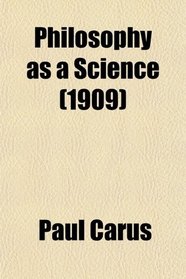Search -
Philosophy as a Science (1909)
Philosophy as a Science - 1909
Author:
Purchase of this book includes free trial access to www.million-books.com where you can read more than a million books for free. This is an OCR edition with typos. Excerpt from book: Is life worth living? Symbols of immortality taught in allegory or symbol are but are but makeshifts to express for people makeshifts. untrained in phi... more »
Author:
Purchase of this book includes free trial access to www.million-books.com where you can read more than a million books for free. This is an OCR edition with typos. Excerpt from book: Is life worth living? Symbols of immortality taught in allegory or symbol are but are but makeshifts to express for people makeshifts. untrained in phi... more »
ISBN-13: 9780217249072
ISBN-10: 0217249078
Publication Date: 8/10/2009
Pages: 116
Rating: ?
ISBN-10: 0217249078
Publication Date: 8/10/2009
Pages: 116
Rating: ?
0 stars, based on 0 rating




